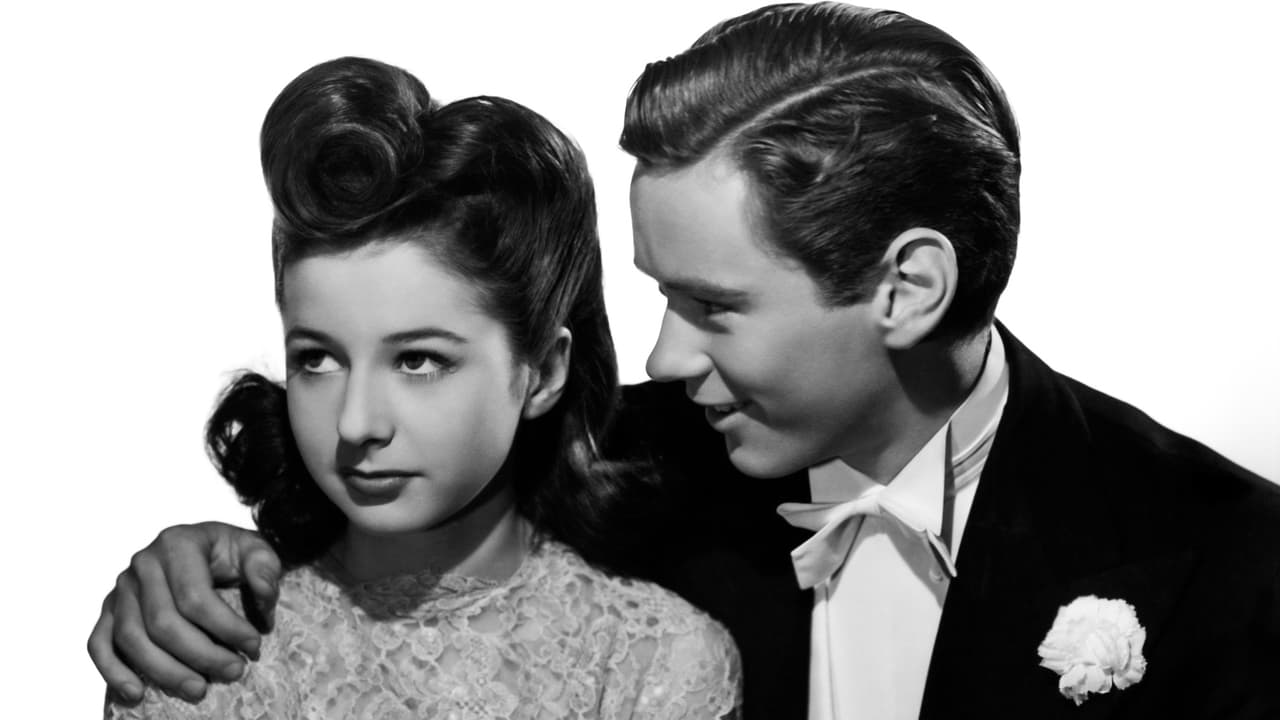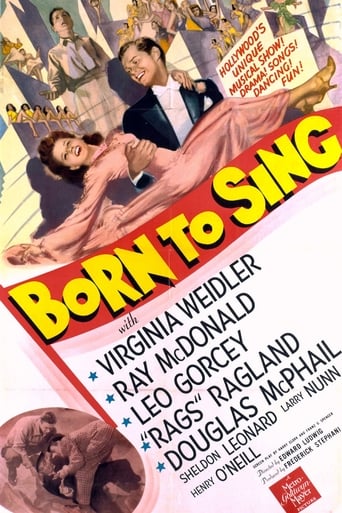

When Ballad for Americans became a big hit in 1939 out of the WPA Theater Project Musical Sing for Your Supper, MGM quickly bought the screen rights to the song. Both Paul Robeson and Bing Crosby made hit recordings of it that same year, though the song is pretty much identified with Robeson now. MGM waited three years before putting it into a film and it went into one of the products of their B picture unit, Born to Sing. This film is no doubt something that Mickey Rooney and Judy Garland rejected for one of their 'let's put on a show' films.It's just that kind of film. Crooked producer Lester Matthews and even crookeder press agent Charles Lane, plagiarize the work of Virginia Weidler's father, Henry O'Neill for their show. Topping that all off they frame Ray McDonald, Larry Nunn, and Leo Gorcey on an extortion rap.As they're being taken to jail, they're riding in the same paddy wagon as gangster Sheldon Leonard. They go along in an escape his gang has planned and he in turn gets ensnared in their machinations. Which as it turns out is to put on a show before Matthews does and showcase O'Neill's music.So help me that's the plot of this one. It's all quite innocently and charmingly done, but the presentation leaves one breathless.Tacked on to the end of the show is Ballad for Americans where the lead singer is Douglas MacPhail whose career came to tragically to an end the following year. Staging the number is Busby Berkeley and the staging of it is similar to some of what he did in Ziegfeld Girl the year before.Why MGM didn't put Ballad for Americans into one of their A films is something we'll never know.
... View MoreIt's been suggested that the ending of "Born to Sing" was some sort of jingoistic war- promoting effort spliced on the end of this film--and it certainly was badly spliced, especially since we are not shown its effect on the audience, which up until the end has been a living part of the film. It should be said, though, that the piece "Ballad for Americans" which concludes the film actually was written for a WPA Theatre production, "Sing for Your Supper," in 1939. This show, 18 months in rehearsal, brought about the end of WPA's "Federal Theatre Project" and never reached much of an audience."Ballad for Americans," though, was written by John Latouche and Earl Robinson, who later produced one of the best American operas, "The Ballad of Baby Doe." The "Ballad for Americans" was introduced on radio by Paul Robeson, who recorded it as did Bing Crosby, and both recordings were best-sellers. The piece was actually performed at the 1940 Republican AND American Communist Party Conventions, and remained in the repertoire through the 1960's. The piece seems rather dated and jingoistic today, though oddly enough it was considered pretty left-wing at the time! I've always had a soft spot for it, as did my high school choir director. The shouted/spoken parts of the piece were a popular device of the time, another practice that lingered through the 1960's in various guises. I think that its inclusion in the film was meant to show just what a fine composer the Virginia Weidler character's father (Henry O'Neill) was (although it stretches the imagine a bit to think that in a couple of evenings Virginia could play it out a few notes at a time on the harmonica and have it transposed by an eight-year-old kid ("Mozart"--Richard Hall) who has to draw his own staff paper.) Unfortunately, we don't know whether it did that or not, because the film ends abruptly at the end of the piece--almost as if the production had run out of money so everybody went home.Actually, I think it was pretty spiffily staged by Busby Berkeley, in a way that is reminiscent of his "Forgotten Man" number at Warner's and in a way that recalls the Deco/Moderne style of much of WPA art.It should also be noted that Joe Yule is featured in a (very) minor role here at a time when his son, Mickey Rooney (AKA Joe, Jr.), was MGM's biggest meal ticket.
... View More"Born to Sing" (1942) could be summarized as "The Bowery Boys Put on One of Those Garland/Rooney Shows". Basically it is a "Bowery Boys" feature with a neighborhood talent show tacked onto the end. But this is not as bad as you might think. The boys are represented by Leo Gorcey; as a character named Snap Collins, pretty much his standard Slip Mahoney stuff. The budget is a bit larger so the technical production elements are better-the cinematography/lighting actually has a nice flare and the production design is quite good. But the best part is that the show is quite entertaining, at least until the super patriotic finale, out of place at best-drifting into pathetic several times, despite some slick staging and excellent use of lighting. This silly song features baritone Douglas McPhail who up to this point has looked totally embarrassed about appearing in the film. Overwrought as it is, the real problem is that it destroys the unity of the main production, which up to then had a lot of charm with the neighborhood children playing all the adult roles on the stage. Suddenly there is a group of actual adults inexplicably parading on stage like something out of "Triumph of the Will".This was Virginia Weidler's last real chance to go from child to adult star, she made a couple other films during the war but nothing that had this much potential. But the grown-up Weidler just didn't have much charisma. In fact, she gets completely upstaged by another teenage actress/singer Beverly Hudson who has a lot more energy and personality than Weidler. Hudson's big number is good enough to justify watching the entire film."Born to Sing's" premise revolves around Patsy Eastman (Weidler) and her father, a songwriter who wrote a show while in prison. Much like "House of Wax", a greedy promoter steals the material. Snap and his friends try to pressure the promoter but are charged with extortion. Fortunately they meet a gangster named Pete Detroit (Sheldon Leonard) who is sympathetic and helps them open their show before the promoter can premiere his; with Pete going so far as to use his fleet of taxicabs to ferry unsuspecting drama critics from the promoter's show to the kid's show. Watch for appearances by Darla Hood (Little Rascals) and Margaret Dumont (Marx Brothers). One notable scene for inclusion in "Blacks in Hollywood" has token black Eightball (Ben Carter) escorting Weidler (in black-face) to the jail to visit her father. They fool the guard by engaging in the extreme stereotypical behavior early audiences seemed to enjoy. Which makes the finale's attempt of rally all Americans (all races, faiths, and occupations) behind the war effort even more hollow.Then again, what do I know? I'm only a child.
... View MoreWhatever points I give this one is strictly based on the talented DOUGLAS McPHAIL and his rich baritone singing the climactic number, "America". MGM obviously was grooming him for big time stardom that never came. He was a Nelson Eddy kind of baritone, stolid looking, rather humorless, but usually just given background roles in any of the studio's big films.Here at least he takes the spotlight in the film's final number, a rousing tribute to Americana. But what precedes this is strictly hokum, a "let's put on the show" routine accompanied by some gangster stuff led by SHELDON LEONARD who gets off some typical '40s tough guy remarks. ("I'm gonna put him in opera if I gotta buy the joint," he says of McPhail.) Another amusing and typical '40s moment has Leonard landing in the same police patrol wagon with a few of the show biz kids, including LEO GORCEY. Another youngster takes one look at his suit and says, "If you get the hot seat, can I have that suit?"VIRGINIA WEIDLER is totally wasted in the leading femme role as the daughter of a musician, but the cast is perked up by RAGS RAGLAND, MARGARET DUMONT, DARLA HOOD and especially young RAY McDONALD, who was a hoofer who ranked easily with Donald O'Connor as one of filmdom's best dancers.Summing up: Unfortunately, never rises above its B-picture material, except for the climactic song celebrating America.
... View More